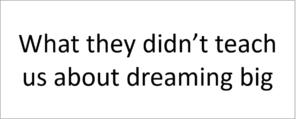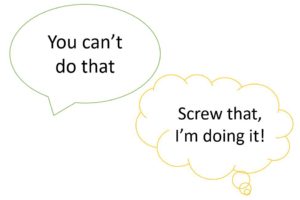Dream Big, They Said
 Remember when we were little kids and we were told we could do anything we set our minds to? We heard it mostly in grade school, but also in after-school programs and from parents.
Remember when we were little kids and we were told we could do anything we set our minds to? We heard it mostly in grade school, but also in after-school programs and from parents.
We were told inspiring accounts of people who achieved great things. We learned of career options from astronaut to president and told we could have those jobs. We were taught about Mother Theresa and Martin Luther King Jr and told we too could do big work with a big impact that helped many people.
We were told to dream and work hard. We could do great things in our lives. We just had to make up our minds and go for it.
Teachers and the others – they can’t very well NOT say those things. Where would we be if we hadn’t been told to have dreams and try to reach them?
I wish, though, that we had been taught what to do when things go wrong in our pursuit of our big dreams. And what to do when life squishes our dreams before we even really attempt to achieve them.
I think it happens as early as high school – when we trade in our grand ideas for more practical matters. Our awareness grows. We understand what we hear on the news and its implications in our own lives…jobs and joblessness, natural disasters, war…
There are also timelines to consider. Preparing for the first job out of high school, or attempting to get into college and then deciding what to study. And then graduating and needing a job and a place to live.
After college I wasn’t dreaming much. I enjoyed my life and dove into the beginning of my career, but looking back, I can say my dreams were replaced by goals.
And my goals – at least the biggest two that I accomplished in my adult life so far – didn’t even come from a strong desire within myself to achieve something meaningful.
Instead, they were inspired by obstinacy.
It is true that since college, if not earlier, I vaguely expected to get an advanced degree at some point in my life. However, it wasn’t until I was rejected from a year-long marketing certificate program that I was motivated to get an MBA. My exact thinking was, “Seriously, I was turned down for a certificate? Screw them, I’m getting a master’s degree.” Some rigorous GMAT prep and five years of school later, I had my degree. Ultimately, I was glad I was refused participation in the certificate because it turned out to be a fraction of what I wanted to learn and was capable of achieving.
 My second example is only slightly different, in that I hadn’t thought about home ownership as a goal at all. I was about to give up my apartment to move to another place with someone when circumstances changed and obstinacy kicked in again.
My second example is only slightly different, in that I hadn’t thought about home ownership as a goal at all. I was about to give up my apartment to move to another place with someone when circumstances changed and obstinacy kicked in again.
I decided I would make housing plans on my own and buy a place instead of renting. I made a budget in excel, put as much as I could into the down payment and fees, and then I owned a home.
I didn’t need to learn to use rejection and setbacks as motivation but I think it should be taught. I hear too many stories from older writers and artists who put down their pens when they were young adults because somebody told them they weren’t talented. It seems like it would be a very useful lesson plan to prepare kids for when they are told no, they can’t, they aren’t good enough, to muster a “screw you” attitude and pursue their art anyway.
Another skill that I wish I had been taught in school is how to channel disappointment into something useful. I get depressed by civic issues of inequity and discrimination and need more than the grade school equivalent of a lemonade stand that raises money for these causes. My stabs at educating myself, speaking up, and seeking out groups to participate in seem the right steps for now, but I was floundering for a long time.
The lemonade stand fundraiser is great to show little kids that they can take initiative and tangibly provide support for causes. But then the cups are put away, the money is donated, and life goes on. What’s missing is sustained effort, and follow-up to see what impact was made. An analysis to determine what about the effort was successful and what can be done to improve. Or how to translate lessons learned into the next effort.
Some of my good friends share this sense of civic-work malaise. We have a sense of being pushed to put our skills and experience to better use. Even people who are working in non-profits or who are on the board of multiple civic groups are unsettled and feel there is more they should be doing. There is a limit to how many action committees a person can reasonably join, so it seems failure to achieve the desired impact is the problem. We’re falling short of our big dreams to make a big impact.
Wouldn’t it be great if we were taught throughout school how to be patient and sustain efforts over a long period of time, even when we don’t see the results we want? I remember being taught about Abe Lincoln’s personal and professional setbacks before he became president. He had business debts that took years to pay off, was a self-taught lawyer, and lost his first attempt to win an Illinois state legislative position.
What isn’t clear is what motivated him to keep pursuing his dreams.
I wonder if he was driven by a belief that he had something to offer people. Maybe he resolved to keep trying, and to look for ways to use his abilities to be of service.
What we do know is that he said yes to opportunities. Clearly he didn’t let fear of failure prevent him from going into business, becoming an attorney, or running for public office. After each misstep, he came back with resilience. Whatever doubts he might have had about his abilities to perform in those professions didn’t stop him from showing up and doing his work.
I didn’t learn these things in school, although I wish I had.
I’ll keep using obstinacy as fuel when people tell me I can’t do something I want to do. I’ll try to be patient with setbacks and keep ahold of my belief that I have something to offer, even when I don’t see progress.
You too, ok? When someone tells you no, go ahead and prove them wrong.
And keep the faith. You’ve got something to offer.

Recent Comments